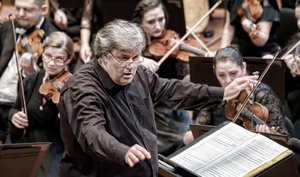BERLIOZ Roman Carnival
DEBUSSY Three Nocturnes
---interval---
LIGETI Clocks and Clouds
RAVEL Bolero
Featuring: New Liszt Ferenc Chamber Choir (conductor: László Norbert Nemes)
Conductor: Zoltán Rácz

Everything French, with an Easter egg surprise. This, in a nutshell, is what the concert promises, opening with Berlioz’s most popular overture. The music of Roman Carnival is taken from opera yet it is an unmistakeable concert overture: Berlioz reworked two scenes from his opera Benvenuto Cellini in 1844, six years after its premiere – and failure. Initially, Debussy’s Three Nocturnes also met a chilly reception in the early 1900s, although later on the trinity of Clouds, Festivals and Sirens – inspired by Whistler paintings – became a classic composition of music Impressionism. Clouds also find their way into the György Ligeti work (1972-73), and in the same way as Debussy’s third nocturne (Sirens), here, too, a female-only choir is called for. “It's a very slow dance, conforming the melody, harmony and rhythm, this last is played continuously by the snare drum. The only element of difference is the crescendo in the orchestra.” This is how Ravel succinctly described Bolero, which at its 1928 world premiere saw a lady cry out several times “he is gone mad!”, to which the composer calmly responded, “that lady understand it”.
